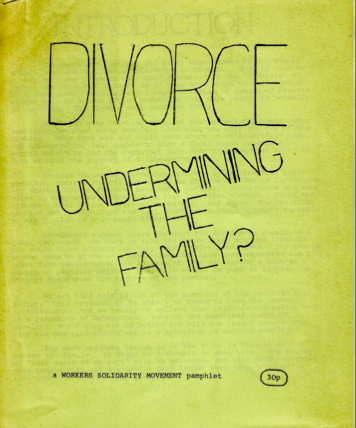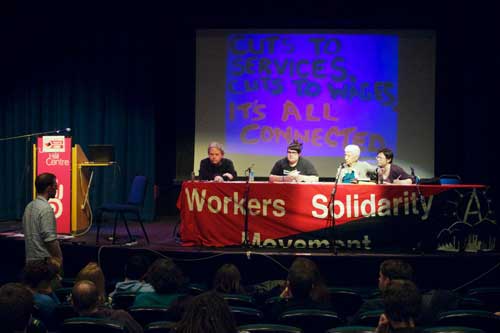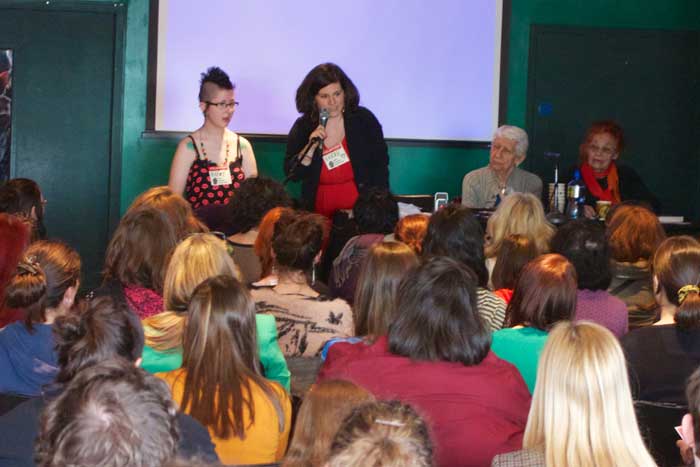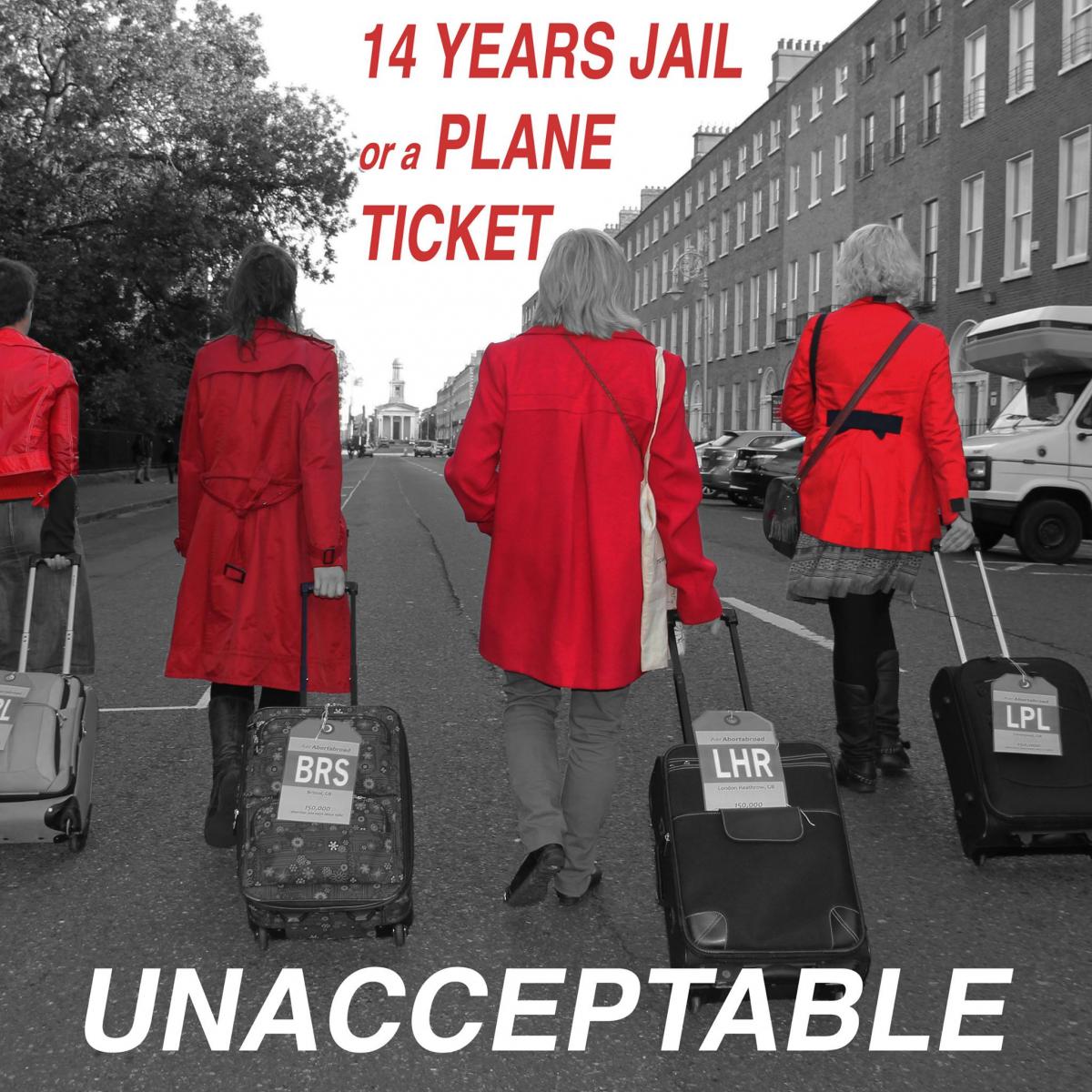Over 30 years of anarchist writing from Ireland listed under hundreds of topics
Gender
Divorce .. Undermining the family? ( WSM pamphlet from 1st Divorce Referendum in 1986)
 This pamphlet was produced by the Workers Solidarity Movement in the weeks before the 1986 referendum on whether or not to remove the constitutional ban on divorce. The vote was lost by a margin of almost 2:1, with 935,843 (63.48%) voting to keep the ban and 538,279 (36.52%) to remove it. A second referendum in 1995 saw the ban finally scrapped, with a result of 818,842 (50.28%) to 809,728 (49.72%).
This pamphlet was produced by the Workers Solidarity Movement in the weeks before the 1986 referendum on whether or not to remove the constitutional ban on divorce. The vote was lost by a margin of almost 2:1, with 935,843 (63.48%) voting to keep the ban and 538,279 (36.52%) to remove it. A second referendum in 1995 saw the ban finally scrapped, with a result of 818,842 (50.28%) to 809,728 (49.72%).
Alone on the far left, the WSM was heavily involved in this campaign and had two members elected to the National Executive of the Divorce Action Group. At the time they described their motivation as being to “increase personal freedoms” and “challenge the power of the Catholic bishops”. Read the full text of the pamphlet in the article.
Care & Social Reproduction - Audio or Video of Selma James & Conor McCabe at DABF 2014

The hardship of the current economic crisis has impacted unevenly across genders. This panel from the 2014 Dublin Anarchist Bookfair discussed the intersection of austerity, care-work and women’s reproductive rights. Selma James and Conor McCabe presented with Conor focusing on what this has meant in Ireland in particular.
My Life in Activism : Women speak at 2014 Dublin Anarchist Bookfair - Audio

The 2014 Dublin anarchist bookfair hosted a panel of women activists who informed us about how they became involved in the movement, what drew them into this life of campaigning for social justice, rights and attempting to change the world in which we live. They inform us of how they remain motivated, inspired and sustained in active political life.
My Life in Activism : Women speak at 2014 Dublin Anarchist Bookfair - Audio by Workers Solidarity on Mixcloud
Anti choice extremists defeated but this legislation is worthless - where next?
 Despite spending in the region of a million euro and getting the backing of the catholic church its now clear that the anti-choice extremists of Youth Defence & the Pro Life Campaign were resoundingly defeated when the Dail finally voted though legislation implementing the X-Case judgment of 21 years ago. This time last year they were confident that they already had enough Fine Gael TD's on board to block the required legislation but they reckoned against the wave of public anger that followed the death of Savita Halappanavar after she was denied a potentially life saving abortion in a Galway hospital.
Despite spending in the region of a million euro and getting the backing of the catholic church its now clear that the anti-choice extremists of Youth Defence & the Pro Life Campaign were resoundingly defeated when the Dail finally voted though legislation implementing the X-Case judgment of 21 years ago. This time last year they were confident that they already had enough Fine Gael TD's on board to block the required legislation but they reckoned against the wave of public anger that followed the death of Savita Halappanavar after she was denied a potentially life saving abortion in a Galway hospital.
Dail vote today - Abortion choices - Plane ticket or prison

12th June saw the publication of the The Protection of Life During Pregnancy Bill 2013 on which the Dail votes this evening. In this piece of legislation, it states,
-
"It shall be an offence to intentionally destroy unborn human life"
-
"A person who is guilty of an offence under this section shall be liable on indictment to a fine or imprisonment for a term not exceeding 14 years, or both."
Inside the Filibuster, an anarchist account of the fight for the right to choose in Texas
 Interview with Texan Anarchist, Jen Rogue
Interview with Texan Anarchist, Jen Rogue
Q. How easy is to get an abortion in Texas?
Depends on what you mean by “easy.” To begin with, there is a very conservative culture that shames and silences women about sex and opts for abstinence-only sex education, which contributes to abortion being inaccessible. Texas is almost ten times the size of Ireland and has the nation’s largest rural population, which is yet another obstacle to access, given the limited options in health care. Additionally, with a price tag of $450 to $3,000 (depending on how advanced the pregnancy is), the cost alone makes access to abortion a huge challenge.
Q. How was this law going to change the situation?
The bill would ban any and all abortions after 20 weeks. Also, it would require clinics to be certified as “ambulatory surgical centres” and their doctors to have admitting privileges at a hospital within 30 miles. This would close almost every clinic in the state, leaving only 5 out of the current 47.
The Politics of Voices: Notes on Gender, Race & Class
 As class-struggle anarchists dealing with the relations between gender, race and class, we must, in theory and practice, pick a path between two pitfalls. On one side is economic reductionism – the reduction of all political questions to the social relations of production – which erases the perspectives and struggles of women, queers and people of colour; submerges their voices within an overly generalised class narrative, in which the idealised Worker is implicitly white heterosexual and male; or consigns their struggles to a secondary importance compared to the “real struggle” of (economic) class against class. On the other is a stultifying and inward-looking liberal-idealist identity politics, concerned fetishistically with the identification of privilege and the self-regulation of individual oppressive behaviour to the (near) exclusion of organised struggle, which, while amplifying the voices of the marginalised, consigns them to an echo chamber where they can resonate harmlessly.
As class-struggle anarchists dealing with the relations between gender, race and class, we must, in theory and practice, pick a path between two pitfalls. On one side is economic reductionism – the reduction of all political questions to the social relations of production – which erases the perspectives and struggles of women, queers and people of colour; submerges their voices within an overly generalised class narrative, in which the idealised Worker is implicitly white heterosexual and male; or consigns their struggles to a secondary importance compared to the “real struggle” of (economic) class against class. On the other is a stultifying and inward-looking liberal-idealist identity politics, concerned fetishistically with the identification of privilege and the self-regulation of individual oppressive behaviour to the (near) exclusion of organised struggle, which, while amplifying the voices of the marginalised, consigns them to an echo chamber where they can resonate harmlessly.
Turn off the Red Light: Should we advocate it?
 “In Turn off the Red Light – Should We Advocate It?”, T.J., explores the problems faced by sex workers in gaining recognition by those who normally fight for workers rights and outlines how criminalisation of demand has created new problems in countries where that has been introduced.
“In Turn off the Red Light – Should We Advocate It?”, T.J., explores the problems faced by sex workers in gaining recognition by those who normally fight for workers rights and outlines how criminalisation of demand has created new problems in countries where that has been introduced.
Sex and Sex Work from an Anarcha-Feminist perspective
 In “Sex and Sex Work from and anarcha-feminist perspective”, Leticia looks at the theoretical background to the debate between those who argue for decriminalisation and those who “see sex work (or even sex in general) as violence against women”. She argues that because sex is commodified, sex workers should be treated in the same way as others who engage in exploitative labour.
In “Sex and Sex Work from and anarcha-feminist perspective”, Leticia looks at the theoretical background to the debate between those who argue for decriminalisation and those who “see sex work (or even sex in general) as violence against women”. She argues that because sex is commodified, sex workers should be treated in the same way as others who engage in exploitative labour.
20 years of inaction on abortion access - now a tragedy
 There are some stories that are hard to cover - the death of Savita Halappanavar, a pregnant women, from septicemia whose life might have been saved if an abortion was not delayed is a hard as they come. According to the Irish Times Praveen Halappanavar, the husband of Savita said she had asked for a termination several times over a three day period only to be told "this is a catholic country."
There are some stories that are hard to cover - the death of Savita Halappanavar, a pregnant women, from septicemia whose life might have been saved if an abortion was not delayed is a hard as they come. According to the Irish Times Praveen Halappanavar, the husband of Savita said she had asked for a termination several times over a three day period only to be told "this is a catholic country."
For years we were aware that the failure of successive governments to legislate could result in a tragedy but when the first reports started to circulate that this had happened we were horrified. How did we come to this point?

